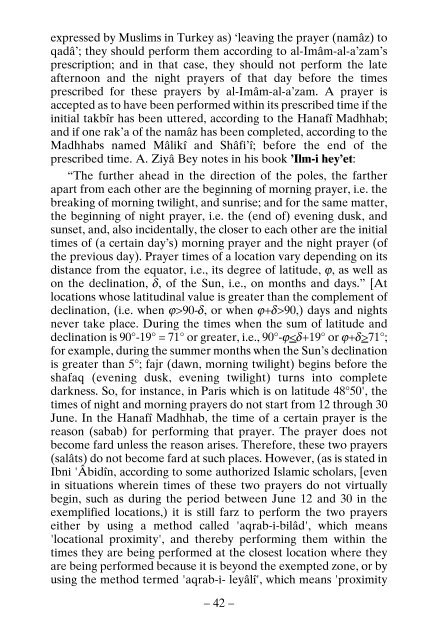O Son !
THE BOOK ‘O SON’ Al-hamdu lillâhi Rabbil ’âlamîn. Wa-s-salâtu wa-s-salâmu ’alâ Rasûlinâ Muhammadin wa Âlihi wa Sahbihi ajma’în. 1– O son! Collecting from books written by the scholars of the Hanafî Madhhab three hundred and sixty hadîth-i-sherîfs and forty-four khabars and also the seven essentials and the five rukns and the seven wâjibs and the fourteen sunnats and the twenty-five mustahabs and the fourteen mufsids of namâz, I have explained them for you. Adapt your acts and deeds to these teachings so that you attain fayz and nejât (salvation)! 2– Also for your information, I have collected a thousand and ninety âdâb (adabs) for you and for other young Muslims like you. If you adapt your actions and acts of worship to these teachings, they will be sufficient for you. If you laze, disobey Allâhu ta’âlâ and cease from these practices and manners, you will be afflicted with slavery and disgrace in the world and subjected to torment in the world to come. If you live up to them and advise your Muslim brothers to do the same, it will be useful for you. They will say blessings over you. And Haqq ta’âlâ will accept their invocations. For, a slave will be pardoned on account of another slave’s invocations for them.
THE BOOK ‘O SON’
Al-hamdu lillâhi Rabbil ’âlamîn. Wa-s-salâtu wa-s-salâmu ’alâ
Rasûlinâ Muhammadin wa Âlihi wa Sahbihi ajma’în.
1– O son! Collecting from books written by the scholars of the
Hanafî Madhhab three hundred and sixty hadîth-i-sherîfs and
forty-four khabars and also the seven essentials and the five rukns
and the seven wâjibs and the fourteen sunnats and the twenty-five
mustahabs and the fourteen mufsids of namâz, I have explained
them for you. Adapt your acts and deeds to these teachings so that
you attain fayz and nejât (salvation)!
2– Also for your information, I have collected a thousand and
ninety âdâb (adabs) for you and for other young Muslims like you.
If you adapt your actions and acts of worship to these teachings,
they will be sufficient for you. If you laze, disobey Allâhu ta’âlâ
and cease from these practices and manners, you will be afflicted
with slavery and disgrace in the world and subjected to torment in
the world to come.
If you live up to them and advise your Muslim brothers to do
the same, it will be useful for you. They will say blessings over you.
And Haqq ta’âlâ will accept their invocations. For, a slave will be
pardoned on account of another slave’s invocations for them.
Create successful ePaper yourself
Turn your PDF publications into a flip-book with our unique Google optimized e-Paper software.
expressed by Muslims in Turkey as) ‘leaving the prayer (namâz) to<br />
qadâ’; they should perform them according to al-Imâm-al-a’zam’s<br />
prescription; and in that case, they should not perform the late<br />
afternoon and the night prayers of that day before the times<br />
prescribed for these prayers by al-Imâm-al-a’zam. A prayer is<br />
accepted as to have been performed within its prescribed time if the<br />
initial takbîr has been uttered, according to the Hanafî Madhhab;<br />
and if one rak’a of the namâz has been completed, according to the<br />
Madhhabs named Mâlikî and Shâfi’î; before the end of the<br />
prescribed time. A. Ziyâ Bey notes in his book ’Ilm-i hey’et:<br />
“The further ahead in the direction of the poles, the farther<br />
apart from each other are the beginning of morning prayer, i.e. the<br />
breaking of morning twilight, and sunrise; and for the same matter,<br />
the beginning of night prayer, i.e. the (end of) evening dusk, and<br />
sunset, and, also incidentally, the closer to each other are the initial<br />
times of (a certain day’s) morning prayer and the night prayer (of<br />
the previous day). Prayer times of a location vary depending on its<br />
distance from the equator, i.e., its degree of latitude, ª, as well as<br />
on the declination, ∞, of the Sun, i.e., on months and days.” [At<br />
locations whose latitudinal value is greater than the complement of<br />
declination, (i.e. when ª>90-∞, or when ª+∞>90,) days and nights<br />
never take place. During the times when the sum of latitude and<br />
declination is 90°-19° = 71° or greater, i.e., 90°-ª71°;<br />
for example, during the summer months when the Sun’s declination<br />
is greater than 5°; fajr (dawn, morning twilight) begins before the<br />
shafaq (evening dusk, evening twilight) turns into complete<br />
darkness. So, for instance, in Paris which is on latitude 48°50', the<br />
times of night and morning prayers do not start from 12 through 30<br />
June. In the Hanafî Madhhab, the time of a certain prayer is the<br />
reason (sabab) for performing that prayer. The prayer does not<br />
become fard unless the reason arises. Therefore, these two prayers<br />
(salâts) do not become fard at such places. However, (as is stated in<br />
Ibni 'Âbidîn, according to some authorized Islamic scholars, [even<br />
in situations wherein times of these two prayers do not virtually<br />
begin, such as during the period between June 12 and 30 in the<br />
exemplified locations,) it is still farz to perform the two prayers<br />
either by using a method called 'aqrab-i-bilâd', which means<br />
'locational proximity', and thereby performing them within the<br />
times they are being performed at the closest location where they<br />
are being performed because it is beyond the exempted zone, or by<br />
using the method termed 'aqrab-i- leyâlî', which means 'proximity<br />
– 42 –

















